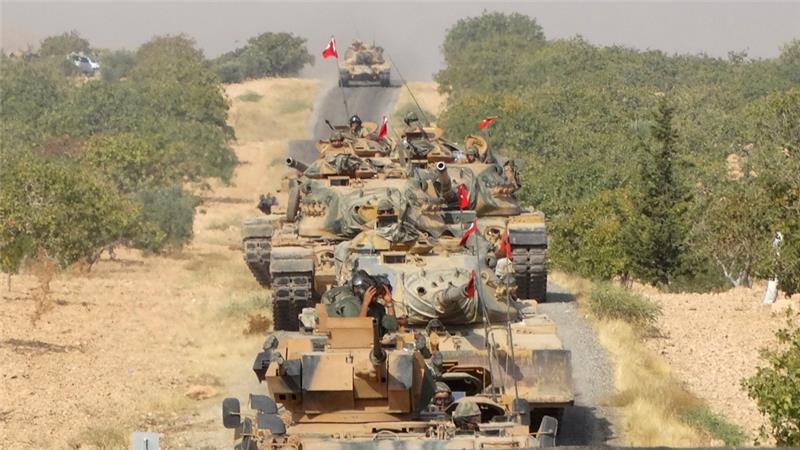
Turkish jets and artillery have targeted Kurdish forces south of the strategic town of Jarablus, according to a monitor and local sources, as Turkey continues a major military offensive inside northern Syria.
Turkey first sent tanks across the border on Wednesday as part of a two-pronged operation against Islamic State of Iraq and the Levant (ISIL) fighters, as well as Kurdish-led forces.
The UK-based Syrian Observatory for Human Rights said Saturday’s air strikes and shelling hit the village of Amarneh, which was captured recently by the US-backed Syrian Democratic Forces (SDF).
The strikes came as Turkish-backed Syrian rebels clashed with Kurdish fighters on the ground.
The Jarablus Military Council, which is allied with the SDF, said the air strikes in Amarneh marked an “unprecedented and dangerous escalation” after Turkish artillery shelling targeted Kurdish YPG forces, the backbone of the SDF alliance, on Friday.
The council said there were injuries, without giving any further details, but warned that the escalation threatened to “endanger the future of the region” and vowed to stand its ground.
Wladimir van Wilgenburg, an analyst based in the nearby Kurdish-controlled city of Qamishli, told Al Jazeera that the clashes had increased throughout Saturday.
“There have been reports that SDF fighters have blown up a Turkish tank. The fighting is ongoing,” he said.
Later on Saturday, one Turkish soldier and three others were wounded in a rocket attack on a Turkish tank south of Jarablus late on Saturday, according to Turkey’s state-run Anadolu news agency, in the military’s first fatality since the launch of its offensive to partly help Syria rebels capture Jarablus from ISIL, also known as ISIS.
Turkish military sources said the rocket was fired from territory held by the Kurdish YPG.
Earlier on Saturday, the Northern Sun Battalion, an SDF faction, had said in a statement that it was heading to “Jarablus fronts” to help the council against “threats made by factions belonging to Turkey”.
Ankara has long accused the YPG, or the Kurdish People’s Protection Units, of being linked to Kurdish fighters in its own southeast.
It has ordered the group, a well-trained force that has been the US-led coalition’s most effective ground partner in the war against ISIL, to withdraw to the east bank of the Euphrates River, which crosses the Syria-Turkey border at Jarablus.
 |
ISIL has controlled territory along the Syria-Turkey border since 2013. And in 2014, US-backed Kurdish forces began a push to retake the border area.
After the Kurdish-led SDF seized the nearby city of Manbij from ISIL earlier this month, it left ISIL with Jarablus as its only border stronghold.
The Turkish offensive pre-empted an attempt by the Kurdish-led forces to take control of Jarablus first.
John Kerry, the US Secretary of State, said on Wednesday during a visit to Turkey that the YPG should withdraw east of the Euphrates, and that a refusal to do so would mean an end to Washington’s support for the group.
Emin Bozoglan, head of the Syrian Turkmen Assembly, told Turkish media on Saturday that the operation in Jarablus is aimed at taking ISIL-controlled al-Bab, near the divided city of Aleppo.
The Kurds have also set their sights on al-Bab.
Their forces aim to connect the main part of Kurdish-controlled territory to the east of the Euphrates with the Kurdish-controlled town of Efrin to the West.
Manbij and al-Bab lie directly in between the two Kurdish de-facto autonomous zones.
“Syrian Kurdish civilians here are worried that it won’t be possible to connect the two sides and make one region,” said van Wilgenburg.
“Now, as both sides push toward al-Bab, things could deteriorate.”
Kerry said late on Friday in Geneva that the US had supported Kurdish fighters on a “limited basis” and remained in close coordination with Turkey.
“We are for a united Syria. We do not support an independent Kurd initiative.”
And while battles between Turkish-backed rebels and Kurdish forces increase to the west of the Euphrates, Kurdish sources said Turkey had also crossed into Syria near Kobane, a symbolic town to the east of the Euphrates, to begin constructing a wall.
“Basically the aim is to shut down all cross-border activity. To stop the cross-border smuggling and to strangle the Kurdish administration,” said van Wilgenburg.
[Source:-Aljazeera]



